Some members of the Cadet Corps pose at the southwest corner of 8th and G Streets in 1905. Photo courtesy of Carol Myers. All photos via the Humboldt Historian.
Organized groups for young people in Humboldt County were rare in 1905, when Reverend Franklin Baker of the Congregational Church, Eureka, formed the Congregational Cadet Corps to foster the building of character and healthy bodies.
Around 120 boys from in and around Eureka joined the group for such activities as camping, hiking, games, producing dramatic skits, playing musical instruments and singing. They were taught to march and to obey their superiors in a semi-military way.
When Baker learned of the great Lewis and Clark Exposition to be held in Portland, Oregon in 1905, he was determined to have his cadets attend by walking there. The boys received the idea with great enthusiasm. They would be walking and camping from Eureka to Portland, a distance of some 500 miles. Although certain people viewed the idea with skepticism because of the distance, rough, wild terrain, and the young age of the hikers, the boys’ parents were eager to have them achieve this feat and fully supported Baker.
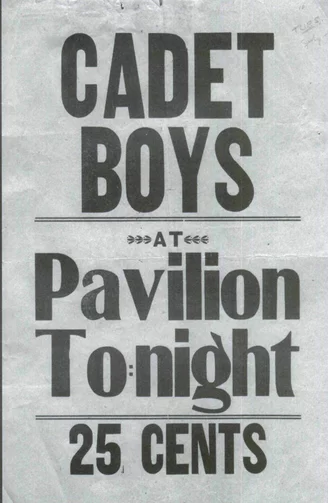
A flier invites Eureka residents to the Occidental Pavillion at 2nd and A Streets, where the Congregational Cadet Corps performed to raise money for their trip expenses.
Members from 10 to 20 years old who participated in the walk were: Joe Moore, Wallace Null, Keith Murray, Homer Cummings, Henry Cox, Fred Holmes, George Young, Ralph Armstrong, Joe Pine, Earl Shields, Stephen Langford, Norris Ferguson, Fred Ferrill, Ed Easley, Gerald Monroe, Ray Freeman, Harold Madison, Alex Davies, Ray Adsit, Henry Anderson, Bert Bradford, Earl Zeigler, Will Williams, Don Young, Lee Burkholder, Leslie Callaghan, Arthur Sharer, Carl Carlson, Wallace Henderson, Arthur Campbell, Fred Farnell, Lesley Freeman, Milton Hudson, Fred Jackson, Harvey Littlefield, Floyd McGeorge, Harvey Pentland, Albert Robinson, Ed Ryerson, Jesse Sanders, Bert Van Sant, Minot Williamson, Arthur Woodhouse, Clarence Cox, Will Dollison, Chester Freeman, Earl Hodgson, Ernest Hipp, Albert Jacobson, Clyde Madsen, Henry Melde, Rodney Rogers, Walter Ryan, Enos Richardson, Arthur Swanson, Frank Wigmore, Clarence Waldner.
Each boy was required to make the following pledge:
Realizing that my going to Portland is dependent upon the following conditions here named, I promise:
1. That I will receive, transact and obey all orders from, and allow myself to be governed by orders from all officers or non- commissioned officers who are my superior in rank;
2. That I will not take any tobacco, cards, or obnoxious literature with me and that at no time during the trip will I have any of the above in my possession.
3. That I will at no time have any money on my person, without special permission from the company’s chaplain.
4. That I will not take with me, or knowingly permit another to take a firearm of any description.
5. Should I be found guilty of any of the offenses here named, I agree to accept any penalty that a summary court martial may see fit to inflict upon me.
The captain who commanded the cadets was Clark Emery; Rev. Baker was the chaplain and had general supervision of the party; Dr. Chauncy L. Bonstell, an Arcata dentist, accompanied the party and was in charge of the concerts given en route; and C. V. Jackson, a Second street clothier, took an active role and posted daily bulletins at his store whenever it was possible to get them.
In preparation for the trip. Baker had worked out every detail. A few days before they were to start, he held an inspection of all the equipment needed. The wagons were loaded with food for the boys, clothing, tents, blankets, and food for the horses.
On Thursday evening June 8, 1905, the Cadet Corps presented their entertainment show for Eureka at the Occidental Pavilion. It was in four parts: scene 1, minstrels; scene 2, gymnasium work; scene 3, campfire; scene 4, drill. The public responded enthusiastically, adding $58 to the boys’ expense account. These exhibitions, to be presented at each town along the route, were an important feature for they were to raise money to defray their costs.
Following the program, the boys headed for their campground where their quarters were inspected by their mothers and fathers. The tents were pitched in line in army style with four boys to a tent. The night was to be divided into three watches, with two men and a corporal in each watch. At 5:45 each morning the boys were to “pile out” and perform ten arm exercises. Breakfast was at 6 a.m. They were to fall in for the day’s march at 7 a.m. The marches were to end at 5 p.m.
The morning of June 12, they paraded around the streets of Eureka, then headed for Arcata around the old road through Freshwater and Bayside, a twelve-mile march. When they reached the slough at Freshwater, they stopped to soak their feet, for walking in their new, heavy, leather shoes made their feet sore.
Baker, both chaplain and business manager, marched in company with the boys. Beyond the pledge, the boys were expected not to swear and to attend Sunday School during the trip. There were boys of every religious denomination in the group.
Captain Clark Emery, a veteran of the Spanish-American War (1898), served as their commanding officer and drillmaster. He was responsible for their Spanish-American War type uniforms: blue shirts, khaki trousers with canvas leggings, canvas hats and their heavy leather shoes.
Dr. Bonstell was their chief musician, and Ed Sedgeley, a Eureka merchant was chief of the commissary. Both men devoted their time and services without pay because they were interested in helping the youth.
Officers were selected from among their comrades: Joseph Moore, Wallace Null and Fred Brown were the lieutenants; 50 privates and two teamsters from Eureka completed the company. Officers enforced strict rules — such as no boy was allowed to leave camp without permission. Strict military discipline was observed throughout the march.
Their plan was to march 15 to 20 miles per day, with a ten-minute rest every hour. The route was to Crescent City, thence to Grants Pass, and up the Willamette Valley. The boys had stationery to write all the letters they wished, to put in a bag to hand to the stage drivers they met on the road.
The cadets practiced their singing as they marched along, accompanied by two horse-drawn wagons that carried their tents and provisions. Each boy took with him: two sets of underwear; six pairs of heavy wool socks (donated by C. V. Jackson); one coat or sweater; one towel, cake of soap and toothbrush; a fork, knife, spoon, cup and tin plate; and one blanket.
Each boy, financially able, paid his own expenses back on the boat from Portland, the cost of which was $7.50. Eleven were unable to do this and funds had to be solicited.
Provided with mailed or wired reports from Baker, both the local and Oregon newspapers ran accounts of the progress of the young marchers, noting each campsite:
The First Day’s March: The 12 mile march to Arcata was not so bad, but it was their shoes that were the source of their complaint. Each boy fitted on his new shoes yesterday.. .they having arrived on Sunday’s steamer. They are of heavy leather soles and thick hide tops, with rivets, a heavier shoe than they are used to wearing . … At Arcata the youngsters rustled up “foot ease ” powders.
Eureka, June 13: The boys started this morning from Arcata north and expect to camp in Trinidad …
Little River, June 14: The sore feet … have all disappeared and the boys are in good shape …
Trinidad, June 14: … the teams drawing the supply wagons got hung up on the hills. Mules were used to help the teams over the heavy grades. The corps has decided to change camp to Big Lagoon … arriving [there] tonight.
Eureka, June 14: A tallyho party composed of fourteen … relatives of the party, left Eureka yesterday with the intention of spending the night with the boys at the Lagoon and returning today. At 3 o’clock this afternoon they had not reached Trinidad … the delay of the supply wagons yesterday was caused by a balky horse, no further delay is anticipated.
… Mrs. Wing of this city has secured donations for this wagon. While returning last night, Mr. H. L. Ricks met the tallyho party en route to Trinidad and reported all in good spirits.
Orick, June 16: They left Big Lagoon yesterday morning and made Orick, 17 miles, last evening . … It is the present intention to reach Crescent City Saturday night in time to present the concert scheduled for the Opera House.
Captain Johnson of the steamer Toledo arrived today with the information that they were unable to reach Crescent City because the last ferry boat crossed the river [Klamath] at 4 o’clock Saturday … they arrived at Crescent City on Monday afternoon after having traveled 25 miles … the boys are still eating mother’s cake … yesterday afternoon the baseball nine of the Cadet Corps played a game with the Crescent City boys and beat them by a score of 14 to 7 they gave a concert and the Opera House was filled to overflowing.
The most difficult terrain to cover were the coastal mountains between Crescent City and Grants Pass, but news reports continued in a cheerful vein.
Gasquet: …this morning the boys had enjoyed a good night’s rest after dining on bacon and eggs; following coffee and zweibach had taken up the march at 7 o’clock. Their motto is Grants Pass on Saturday or Bust.
They learned that they needed to start earlier in order to avoid the heat of the day.
Monument Mine, Oregon: We had duck and trout for supper last night. We camped in the yard where old man Dunne was murdered and some of the boys imagined they saw ghosts. Some of the boys have lost weight and some have gained, but all are standing the trip well.
Waldo, Oregon: … again a delay owing to the breakdown of a wagon about two miles beyond Waldo … waiting for repairs… there is a stream filled with trout, so all the boys are having a jolly time fishing for today’s dinner.
Selma, Oregon:.. .the rocky roads make the task of walking arduous …the provisions which they took from Eureka are nearly gone, and they are obliged to replenish their larder at way stations. The boys report the fish are plentiful and furnish a goodly share of the bill offare each day … . Grants Pass promises the freedom of the city …the people of Oregon are most hospitable..
.. .we could tell just when we passed into Oregon by the condition of the roads, the rockiest in the world. It made our feet homesick for the Humboldt roads… our greatest expense just now has been our horses, their care and feed. In fact the boys are walking the teams down. Cadets Klepper, Wing, and Cottrell have ridden but one day —then on account of their shoes … they are showing wear. The boys stood the heat and dust well, although we looked like mud daubers when we got here. Roads are very dusty but are getting better and smoother
###
The cadets arrived in Grants Pass the next evening after a 22-mile hike, tired but pleased to be only one day behind schedule. It was particularly gratifying to parents and those in charge that all the boys remained well. Their performance in Grants Pass was presented to a crowded Opera House, and the treasury was somewhat richer.
Clarence Waldner wrote an interesting letter to his father about his impressions of Grants Pass:
Grants Pass is quite a place. It has more brick buildings than Eureka… . The big overland Southem Pacific freight and passenger trains pass through here about every half hour.. .made me think of the time we went East … now don’t think I’m lonesome or homesick, because if you do, you are badly mistaken.
When we came into town yesterday, we marched to the post office … then to our camp and passed the railroad station. We scared a big dray team and it scared another and they ran up the street. The second team pushed the first into an enclosure which I guess is a city park… the team broke the fence down … the dray was broken and two of the horses injured. The owner came last night and tried to make us pay $500 damages.
The roads in Oregon are dusty and rocky and the water full of alkali. Of all the country I have seen. I think Humboldt is the best. Grants Pass is a fine town and all the streets are lined with shade trees … the houses have awnings on them …
Some of the boys had never seen a passenger train bigger than the ones in Eureka, and last night one came along with 19 cars. I am writing on Harold Madsen’s drum … I enclose some seeds from a tree growing on the street … I think it is a locust tree.
###
Myrtle Creek, July 1: Reached here last night after a 20 mile march … weatherfine but cloudy … just received telegram announcing the death of Earl Zeigler’s mother. We all feel very sad over it.
According to dispatches, the people of Roseburg have prepared an ovation for the boys An entertainment will be given at the Opera House and every seat has been sold.. . will stop over Sunday … those who wish to swim, may do so. The trip to Portland is now about half over, and if all goes well, we will be in Portland in three weeks.
Roseburg, July 2: … about a dozen men in blue uniforms met us. They called themselves soldiers, but I was afraid to believe it … Joe and I got ahold of some money and were in a bakery shop when Captain and Mr. Baker came in and tackled us … you should have heard the stories we told … all the kids are feeling fine except poor little Zeigler … excuse the dirty paper … most all the kids have gone down to see the big trains. I tell you those trains are swell affairs. It is awful hot.
The Cadets celebrated the Fourth of July at Yoncalla. They spent the day resting and celebrating in the usual fashion. Not one accident happened because “… great care was taken by Rev. Baker and the other leaders that no undue enthusiasm was manifested.”
Drain, Oregon: … gave a concert and played baseball with the Drain Juniors and defeated them.
Eugene, Oregon: … an entertainment was given at the Opera House… the boys were enthusiastically received by the citizens … and all were entertained at dinner among the private families of the city.
The Daily Register reported the cadets’ visit:
Tired, dusty and clothes in bad shape, these plucky young fellows came marching up Willamette Street to their camp across from the Cross Hotel … a large bundle of mail awaited … the faces of the youngsters just shone as they received fond messages from home … really a treat to see so many youngsters abstaining from tobacco and liquor and profanity. It was really marvelous how each boy had a kind word for the other one.
Corvallis: … on the road this side of Corvallis … played two games of ball at Harrisburg yesterday and gave a concert … one in Corvallis tomorrow … one month since we left home.
Salem, Oregon: … arrived at Salem at 4 o’clock, after longest march of any one day. The reception awarded the boys was a royal one. They were made happy by the sight of some familiar faces here, several Eurekans joining the party at the capital city … Mrs. Franklin Baker and Miss Jones.
An article by C.M. Shields:
Saturday morning Messrs. Pine, Noe, Cottrell and Schüler, Mrs. Moore, Miss Hartford, Miss McKinnon and myself went down to Salem to meet the Cadet Corps. The wagon road parallels the railroad, and I saw the dusty way over which they must travel … they look tired, but they are gritty in more ways than one. They stood at stoic attention to receive their mail …I saw one little fellow who had none sit down flat on the ground and pull his hat over his face. I went to him, and throwing my arms around him, lifted his hat and saw his tears. I gave him the kiss that his mother had asked to be delivered and all the loving messages she had sent, and smiles dried his tears. Oregon City, Woodburn—and on to PORTLAND!
###
The Congregational Cadet Corps pose in front of the arcade at the Lewis and Clark Exposition in Portland in 1905.
After a march of 510 miles the Congregational Cadet Corps of Eureka arrived at Portland yesterday morning and made a triumphal entry into the Exposition grounds at 1:30. Their line was headed by the Exposition Band, which was followed closely by Earl Hodgson, the mascot, carrying a banner bearing the words: “We Hiked 510 Miles from Eureka, California. ” They will remain about 10 days and expect to start home by steamer July 29. The cadets left Eureka about the middle of June.
They are going to he the whole show this week. Nothing is too good for them. Their photographs were in all the papers and people stopped them on the street. I stood before the “shredded wheat” demonstration booth today, and some cadets were patiently waiting in line for a biscuit with cream, when the proprietor said, “Here give these boys some … they have walked 500 miles to see the Fair!”
This is California Week at the fair and Tuesday was Eureka Day … escorted by the Sherman Indian Band, the corps marched from Camp Humboldt to the California building … they were presented a handsome blue satin banner lettered in gold, trimmed with heavy vullion fringe and a staff surmounted by a golden eagle. Little ten-year-old marched every step of the way and never uttered a complaint or shirked a duty, had the honor of receiving the banner., looking shy, he turned redder and redder and broke into an abashed smile beautiful to behold.
After the exercises were over the cadets and their Humboldt friends were invited to the art gallery for refreshments .
… Mr. Filcher, wife of the president of the California commission told me: they were the prettiest behaved boys that she had ever … received, speaking particularly of their nice table manners … After lunch, the boys gathered around the piano and rendered some of the concert selections, “Portland or Bust ” and “Dear Old Hills of California, ” and then departed with their hands full of oranges.
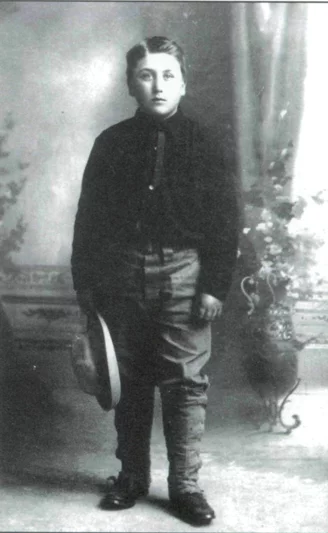
Cadet Cecil Wing, age 11, in 1905. He later married Meredith Stewart and had nine children. He died in 1973. Photo courtesy of Carol Myers.
That evening they gave their sixteenth concert [in Portland] and received great praise for the quality of their voices and training. Their personal appeal was unquestioned:
Inimitable Irish Monroe sang his way into the hearts of everyone with his “Yankee Doodle Boy” and when little Clepper sang in his pretty baby voice” The U.S.A. ” the ladies present wanted to kiss him… .for young Wing, one lady said, “I am going upon the stage just to kiss that pretty round-faced boy. ” … . “Sky ” Herrick’s baritone solo, “Sentinel Asleep” with rich, deep chorus support was a choice number. Lester’s voice is a surprise to his friends and to the lad himself, I think.
###
Eureka Day was an unqualified success. Many travelers from throughout the U. S. who had never heard of Humboldt or Eureka were now familiar with the North Coast city. There was criticism of the Chamber of Commerce and the Board of Supervisors for not having an accompanying display of goods and attractions and a Humboldt Booth at the exposition.
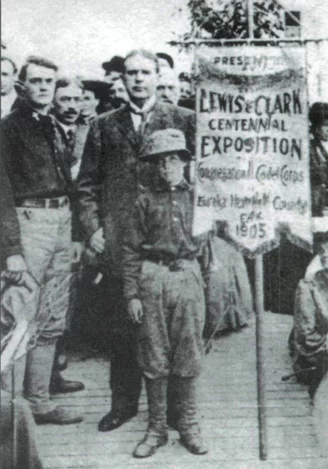
Earl Hodgson, age 10, and the Reverend Franklin Baker accept a banner from the Lewis & Clark Centennial President on July 25, 1905.
The cadets’ departure from Portland was one of great flourish and fanfare. They marched to the gates of the exposition, gave departing cheers for Portland, the Lewis and Clark Exposition, President Goode, Major McDonnell and the State of Oregon. Then with drum and bugle and the blue satin gift banner flying, they marched three miles to the wharf to board the North Pacific Coast Company’s steamer Roanoke.
There was a great crowd to see them off. On arriving they learned that 47 boys must occupy steerage berths, the others in second cabin. Volunteers offered to take the poorer accommodations, not wishing to have better than their comrades. A two-hour delay in departure occurred because of difficulty getting the horses aboard. As the vessel swung into the stream, the boys sang with fervor “Dear Old Hills of California.”
The captain gave them the range of the ship. They entertained in the social hall and received much attention from the passengers. At night deep in the heart of the steamer, most of them slept in high tiered berths. Fortunately there was a smooth sea. For many it was their first voyage.
The steamer Roanoke carried the Cadet Corps home from Portland to Eureka.
EVERY MOTHER’S SON IS A HERO was the Eureka headline marking the return of the cadets from Portland. They had been gone 39 days. Accounts of the welcome follow:
The … steamer was sighted from the lookout about 2 o ‘clock and soon crossed the bar … when threading her way through the entrance … people from all over Eureka were … gathering at the foot of E Street … Many boarded launches and went down the bay where the Roanoke had dropped anchor in the stream near the Bayside Mill. H. L Ricks in his automobile boat took a run down the bay with … friends … the wharves resembled a scene from a fireworks display.
Quickly the boys scrambled up the gang plank, and formed a line at First Street. Not a mother was permitted to grab a youth … and the march was made to the church. The crowd followed. At the church … that mother’s boy was her own again.
At 7 o ‘clock … the youths in travel-stained uniforms fell in line and marched to Railroad Street. They were met by the Corps of Christ Church, under Dunbar, and the members of the club who stayed at home under Captain White. The Eureka and Sequoia bands in full uniform were at the wharf and marched to the church together with the cargo laden wagons. The bands volunteered and donated their services.
###
An official welcome was given the cadets at the church with speeches from Mayor A. W. Torrey, M. Modhams and Reverend Matlock. There was high praise for the boys and their leaders for bringing attention to Humboldt County and the educational experience afforded the cadets themselves.
Matlock announced that the Chamber of Commerce had arranged to give each boy who made the trip a bronze medal, designed by Mrs. Clark Emory and made by Frank Anderson. It was to be a round medal, bearing on the front a cadet in full marching order, and the inscription “To Portland or Bust.” The other side read. “We hiked it 510 miles from Eureka to the sea, sea, sea,” and Lewis and Clark Exposition, 1905. The announcement about the medals was a surprise.
Committee for the reception was: Mesdames Clark Emery, N. H. Pine, George Langford, Frank Herrick, Emory Wing, J. H. Holmes, L. A. Brown and C. V. Jackson.
That evening the boys presented their show again at the Occidental Pavilion to a large audience, giving parents, friends, and the public a chance to see how they earned their expenses. Rev. Baker described the trip with many colorful anecdotes.
The Congregational Cadet Corps had the time of their lives and memories they never forgot. I wish I could have walked that walk.
###
Author’s Note: Material for this story was taken from undated, unidentified newspaper clippings from the Oregonian, Times, Standard and papers from cities along the march saved by Wallace Null, one of the 60 cadets who walked that 510 miles.
###
The story above was originally printed in the Winter 1997 issue of the Humboldt Historian, a journal of the Humboldt County Historical Society. It is reprinted here with permission. The Humboldt County Historical Society is a nonprofit organization devoted to archiving, preserving and sharing Humboldt County’s rich history. You can become a member and receive a year’s worth of new issues of The Humboldt Historian at this link.
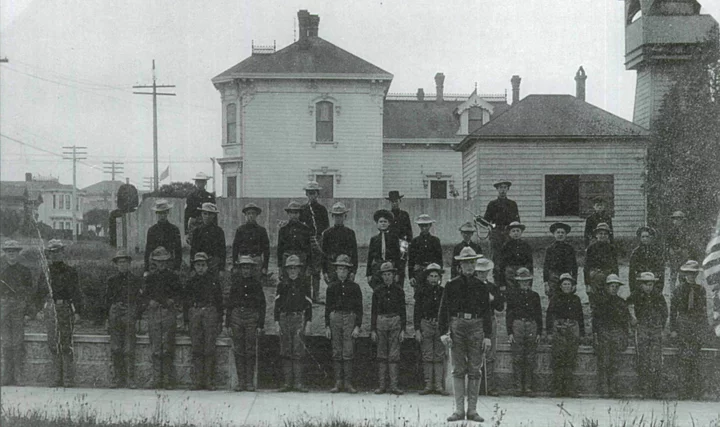
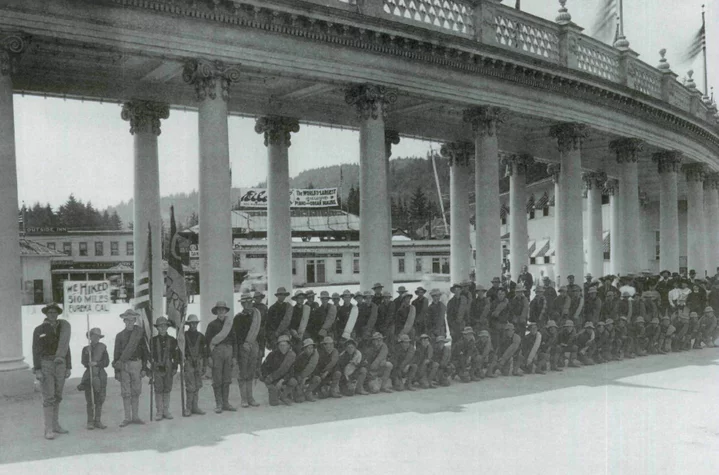
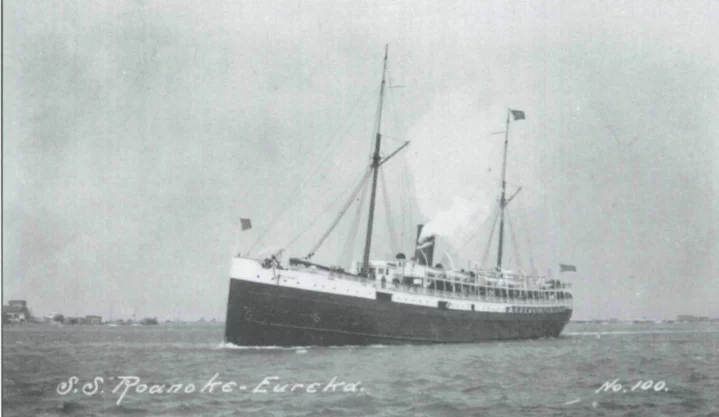
CLICK TO MANAGE